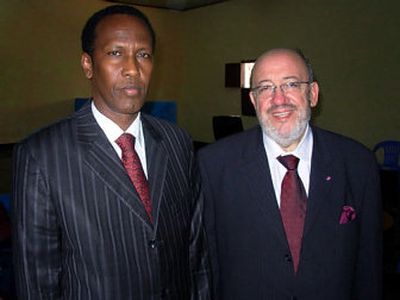Prime minister reaches capital

MOGADISHU, Somalia – Somalia’s prime minister promised thousands of war-weary Somalis peace and stability Friday as he formally took control of the battle-scarred capital for the first time since his government was formed two years ago.
Ali Mohamed Gedi drove through the streets of Mogadishu in a heavily armed convoy a day after Islamic fighters fled and his Ethiopian-backed troops seized the city.
“Today is the beginning of a new life, new stabilization and a new future for Somalia,” Gedi told cheering residents.
As a sign of good will, President Abdullahi Yusuf and the Ethiopian government declared a 24-hour cease-fire to mark the Muslim holiday of Eid al-Adha today.
But with violent protests in one neighborhood in support of the Islamist fighters who had vowed to establish a government based on the Quran, and the movement’s leader promising to fight on from a key southern town, the task facing Somalia’s U.N.-backed, secular government is immense.
There was a glimmer of hope after key Islamic officials traveled to Kenya, where the government had been hoping to foster peace negotiations. But Gedi ruled out the possibility of immediate talks with the Islamic movement.
“We cannot talk peace after all this bloodshed,” he said.
Even before the rise of the Islamists, Gedi’s government had been kept out of Mogadishu by clan violence. There was an attempt on his life during a rare trip to the city in November 2005.
On Friday, though, he was embraced. Waving Somali flags, thousands lined the streets and climbed onto buildings to catch a glimpse of their new leader in the seaside capital.
“This is a historic day for us,” said Sahra Yusuf, a mother of three who was dressed in traditional white cloth. “This is a sign that Somalia will be able to stand on its own feet.”
Amid tight security with marksmen on rooftops, Gedi was more realistic, appealing for help to rebuild a country ruined by 15 years of civil war and infighting. He also called for regional peacekeepers to help ensure further violence does not erupt.
Martial law was expected to be imposed across the country by parliament today.
The U.S. State Department called for all Somalis to achieve “genuine national reconciliation” and reiterated its support for an African peacekeeping force to be deployed in the country.
Government troops backed by Ethiopian soldiers have swept quickly across the country since Sunday, retaking territory captured by the Islamic movement earlier this year. The government had previously only controlled the western town of Baidoa, where it had set up its base.
Many in overwhelmingly Muslim Somalia, however, are skeptical of the government’s reliance on neighboring Ethiopia, a traditional rival with a large Christian population and one of Africa’s largest armies. Ethiopia and Somalia fought a bloody war in 1977.
Earlier Friday, Ethiopian troops aboard tanks fired warning shots into the air after dozens of young men threw stones as the convoy traveled through the city on the way to secure the airport.
Yusuf said Ethiopian troops would stay in Somalia for now because “the government is not up to the level of taking back the entire country overnight.” He vowed to pursue those still willing to fight for the Islamic group.
Sheik Sharif Sheik Ahmed, the executive leader of the Council of Islamic Courts, the umbrella group for the Islamic movement, said Friday his fighters would remain defiant.
“We will not run away from our enemies. We will never depart from Somalia. We will stay in our homeland,” he said from the southern city of Kismayo, where his forces retreated from Mogadishu.
Hundreds of foreign fighters, mainly Arabs and southern Asians, were seen in Kismayo on Friday. Some of the Islamic movement’s members espouse an extreme form of Islam, and the United States accuses it of harboring al-Qaida terrorists.
Somalia’s president vowed to take the fight to Kismayo. “We are going to go there and confront them,” Yusuf told reporters. “If we capture them, we will bring them to justice.”
Ethiopian jets continued to buzz the front-line town of Jilib, 65 miles north of Kismayo. Jilib is at a crucial junction of rivers and roads that lead to Kismayo.
Before the Islamists established control, Mogadishu had been ruled by competing clans who came together to support the Islamic fighters. Somalia’s complex clan politics have been the undoing of at least 14 attempts to install a government in this violent, anarchic nation.